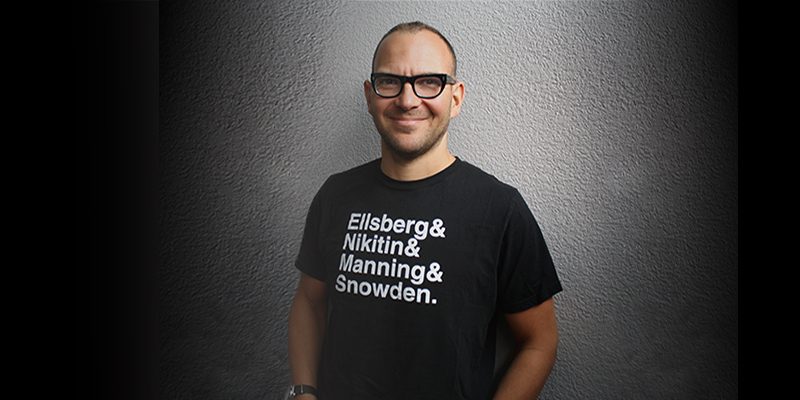Cory Doctorow: Audible, Comixology, Amazon, and Doctorow’s First Law
 It’s been half a decade since I coined ‘‘Doctorow’s first law of electronic publishing’’: ‘‘Any time someone puts a lock on something that belongs to you, and won’t give you the key, you can be sure that the lock isn’t there for your benefit.’’
It’s been half a decade since I coined ‘‘Doctorow’s first law of electronic publishing’’: ‘‘Any time someone puts a lock on something that belongs to you, and won’t give you the key, you can be sure that the lock isn’t there for your benefit.’’
I’m talking, of course, about ‘‘digital rights management,’’ one of those immortal, terrible ideas that resurfaces under a new name every couple of years. You may know it in one of its other euphemistic guises, like ‘‘copy protection,’’ or ‘‘digital locks,’’ or ‘‘technical protection measures.’’ I’ll just call it ‘‘DRM,’’ because that can also stand for ‘‘digital restrictions management,’’ which is a much more apt name for it.
DRM attempts to accomplish the impossible. The idea of DRM is that I, the publisher, don’t trust you, my customer, with my products. However, I want your money, and you won’t part with it unless I give you the product. So I give you the product – an e-book – but hope that I can somehow control how you use it after I’ve given it to you.
In order to do this, I supply the e-book in a scrambled format. Then I supply you with a program that can descramble the e-book, but that won’t let you save it in a descrambled, share-able form. And I pray with all my might that you won’t figure out how to subvert this program, even though historically this has been a terrible bet, a task akin to keeping the bank vault in the robber’s living room and trusting the lock to keep her from opening it and walking away with the contents.
As silly as this idea sounds, it has gripped policy-makers and technology vendors with a kind of feverish zeal that has endured for decades. Back in the 1990s, the world’s governments started to enact laws to protect DRM. They had been sold on a story of how DRM could be used to sell rights to all digital goods in infinitely subdivided, variably priced slices (‘‘rent this movie for ten minutes on a Wednesday for half price!’’).
The laws they made started with a pair of UN treaties passed in 1996: the WIPO Copyright Treaty and the WIPO Performers and Phonographs Treaty, which were integrated into US law through the 1998 Digital Millennium Copyright Law, or DMCA (compliance with these treaties is also a condition of participating in the World Trade Organization).
Under the DMCA, removing DRM is against the law, even if you’re not otherwise violating copyright. For example, under copyright, you have the ‘‘fair use’’ right to publish brief excerpts from a movie as part of your critical analysis, but if that movie is locked up with DRM (as all DVDs are), you are not allowed to remove the DRM to accomplish this.
Likewise, your right to ‘‘format shift’’ your DVDs to files that can play on a tablet or phone is superseded by the prohibition on removing DRM to do this. That’s why Apple’s iTunes will helpfully rip your CDs and load them onto your tablet for you, but won’t do the same for your DVDs.
Critically, publishers, authors and other copyright holders cannot create or distribute DRM-breaking technology to unlock their own works, after those works have been locked up with a tech company’s DRM. Random House, with all its market might, cannot authorize you or enable you to break the Amazon DRM on its books.
And without this DRM removal, you can’t move Amazon e-books to competing ereaders – Kobo, Nook, etc – meaning that every dollar that Random House books generate in sales is a dollar that Random House’s customers will have to surrender if Amazon and Random House part ways and Random House hopes to tempt those readers to come along as it moves to one of Amazon’s rivals.
This isn’t a hypothetical, these days. As I write this, in July 2014, we’re into the second month of a serious dispute between Hachette (owner of Little, Brown; Orbit; and many other imprints) and Amazon over pricing, discounts and promotions, in which Amazon has simply stopped carrying Hachette e-books in its Kindle store. Hachette could fight back by offering a tool to convert all your Kindle books to run on rival platforms and offer 50 percent discounts on all its titles everywhere except Amazon until the dispute was resolved, sending tens of thousands of previously loyal Kindle customers into a rival’s clutches.
Or rather, Hachette can’t do that, because the company has a doctrinaire belief in DRM, and has insisted that every one of its e-books ever sold by Amazon had Amazon’s DRM on it. Only Amazon can remove Amazon’s DRM from Hachette books, and they’re in no hurry to release Hachette’s readers from their walled garden.
Amazon has a complicated relationship with its retail suppliers, customers, and DRM. The company made history in 2008 by launching a DRM-free store to compete with Apple’s Itunes, which required that all the labels who supplied it agree to its DRM. Apple later removed DRM from iTunes and insisted that it had hated DRM all along, but requires DRM for its apps, videos, audiobooks, and virtually every other digital product it sells.
Like Apple, Amazon eschews – and decries – DRM where there is a competitive reason to do so, but it insists on DRM in those categories where it dominates, requiring its suppliers to allow their copyrights to be locked up with a lock whose key only Amazon possess.
Take Amazon’s subsidiary Audible, a great favorite among science fiction writers and fans. The company has absolute dominance over the audiobook market, accounting for as much as 90 percent of sales for major audio publishers. Audible has a no-exceptions requirement for DRM, even where publishers and authors object (my own audiobooks are not available through Audible as a result). Audible is also the sole audiobook supplier for iTunes, meaning that authors and publishers who sell audiobooks through iTunes are likewise bound to lock these to Amazon’s platform and put them in Amazon’s perpetual control.
As John Scalzi wrote recently:
These businesses and corporations are not your friends. They will seek to extract the maximum benefit from you that they can, and from others with whom they engage in business, consistent with their current set of business goals. This does not make them evil – it makes them business entities (they might also be evil, or might not be, but that’s a different thing). If you’re treating these businesses as friends, you’re likely to get screwed.
Anyone who believes that Audible would hesitate to use its market power to extract additional profit at the expense of its suppliers – that is, writers and publishers – is delusional. Not because Audible is evil, but because it is a for-profit corporation that is seeking to maximize its gain. The lesson of Hachette is that Amazon plays hardball when it can, and the more leverage Amazon has over its suppliers, the more it will use that leverage to its suppliers’ detriment.
Even if you are a copyright True Believer who loves DRM, all of your alarm bells should go off when you learn that a tech company has decided that it, rather than copyright holders, should have the final say over whether or not DRM is used. The foundational belief of the copyright religion is that copyright is property owned by creators and publishers. If a retailer won’t let you sell your property in the manner of your choosing, you can bet that this isn’t a decision prompted by a charitable impulse to protect you from your thieving customers.
The good news is that Amazon is biddable. Its industry-dominating e-comics division, Comixology, announced in July 2014 that it would allow its publishers to sell their comics on a DRM-free basis. This means that comics publishers can sell through Amazon without selling out to Amazon. This is a remarkable turn of affairs, and quite laudable, because it means that comics readers who buy from Amazon can read, organize, and use those comics alongside all the other comics they buy, including comics bought from Amazon’s competitors.
There is no market demand for DRM. No comics fan, audiobook listener, or e-book reader woke up this morning and said, ‘‘You know what I want? Electronic media that lets me do less!’’
A July 2014 report by Author Earnings found that DRM-free independent e-books on Amazon outsold their DRM-encumbered rivals at a ratio of two to one. This finding jibes with Tor Books’ multi-year project of selling its entire catalog without DRM, and with Baen Books’s even longer-running practice of selling its electronic list without DRM.
But additional sales and readers’ manifest preferences are only the superficial reason to stay away from DRM. The real reason for authors and publishers to avoid DRM isn’t the short-term boost in sales: it’s the long-term control over their destiny.
Cory Doctorow is the author of Walkaway, Little Brother, and Information Doesn’t Want to Be Free (among many others); he is the co-owner of Boing Boing, a special consultant to the Electronic Frontier Foundation, a visiting professor of Computer Science at the Open University and an MIT Media Lab Research Affiliate.
From the September 2014 issue of Locus Magazine






